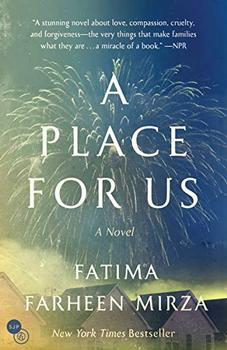Summary | Excerpt | Reading Guide | Reviews | Beyond the Book | Readalikes | Genres & Themes | Author Bio

The previous night, when Amar first arrived, the two of them had been amicable. Rafiq had said salaam before Layla took over and guided Amar to his bedroom, heated him a plate of dinner.
For a moment, she wondered if she had hurt Rafiq. Carefully he clasped the button at each wrist.
"I will not go near him, Layla," he said finally, dropping his arms to his sides.
When he met his father's eyes from across the crowded hall, Amar understood that an agreement had been made between them: they knew who they were there for, and why they would not approach one another beyond the expected salaam. Amar looked away first. He still felt it. His anger, and the distance it caused. It was as if something had clenched in him and could not now be loosened.
Amar had played a game during the first few conversations when asked what he had been doing lately. A painter, he said to one guest, of sunsets and landscapes. The look on their faces amused him. To another uncle he said engineer but was annoyed by how it impressed him. Once he said he was pursuing an interest in ornithology. When the man blinked back at him he explained. Birds, I would like to study birds. Now he spoke without embellishment. He excused himself from conversations shortly after they began.
He stepped out beneath the arched doorway, past the children playing, past the elevators, until the shenai quieted. He had forgot- ten what it was like to move through a crowd feeling like a hypocrite, aware of the scrutinizing gaze, of his father expecting Amar to embarrass him, anticipating the lie he would tell before he even spoke. He walked until he found himself standing before the bar on the other side of the hotel. Of course, no one invited to Hadia's wedding would dare come here. The sound of the shenai was so far away he could catch it only if he strained to hear. He took a seat beside two strangers. Even that felt like a betrayal. But taking a seat was not the same as ordering a drink. He leaned forward until he could rest his elbows on the counter, lowered his face into his hands and sighed.
He could hardly believe that, just the night before, he had managed to walk up to the door of his childhood home and knock. What had surprised him was how little had changed—the same tint of paint at nighttime, the same screen missing from his old window on the second floor. There were no lights on. Wide windows, curtains drawn, nobody home. Nobody would know if he decided to step back into the street. It was a comforting thought—that he would not have to face his father or see how his absence had impacted his mother. The moon was almost full in the sky and as he had when he was a child, he looked first for the face his schoolteacher had said he could find there, then for the name in Arabic his mother always pointed out proudly. Finding them both, he almost smiled.
He might have walked away were it not for a light turning on in Hadia's room. It glowed teal behind the curtain and the sight of it was enough to make his chest lurch. She was home. He had made his life one that did not allow him to see or speak to his sister, to even know she was getting married until she had called him a month earlier, asking him to attend. He had been so startled he didn't pick up. But he listened to her voicemail until he had memorized the details, felt sure some nights he would return and on other nights knew no good would come of it. Her lit window and his own dark beside it. One summer they had pushed out their screens and connected their rooms by a string attached to Styrofoam cups at each end. Hadia assured him she knew what she was doing. She had made one in school. He wasn't sure if he could hear her voice humming along the string and filling the cup, or carried through the air, but he didn't tell her this. They pretended a war was coming to their neighborhood. This was Hadia's idea—she had always been brilliant at thinking up games.
Excerpted from A Place for Us by Fatima Farheen Mirza. Copyright © 2018 by Fatima Farheen Mirza. All rights reserved. No part of this excerpt may be reproduced or reprinted without permission in writing from the publisher.
Your guide toexceptional books
BookBrowse seeks out and recommends the best in contemporary fiction and nonfiction—books that not only engage and entertain but also deepen our understanding of ourselves and the world around us.